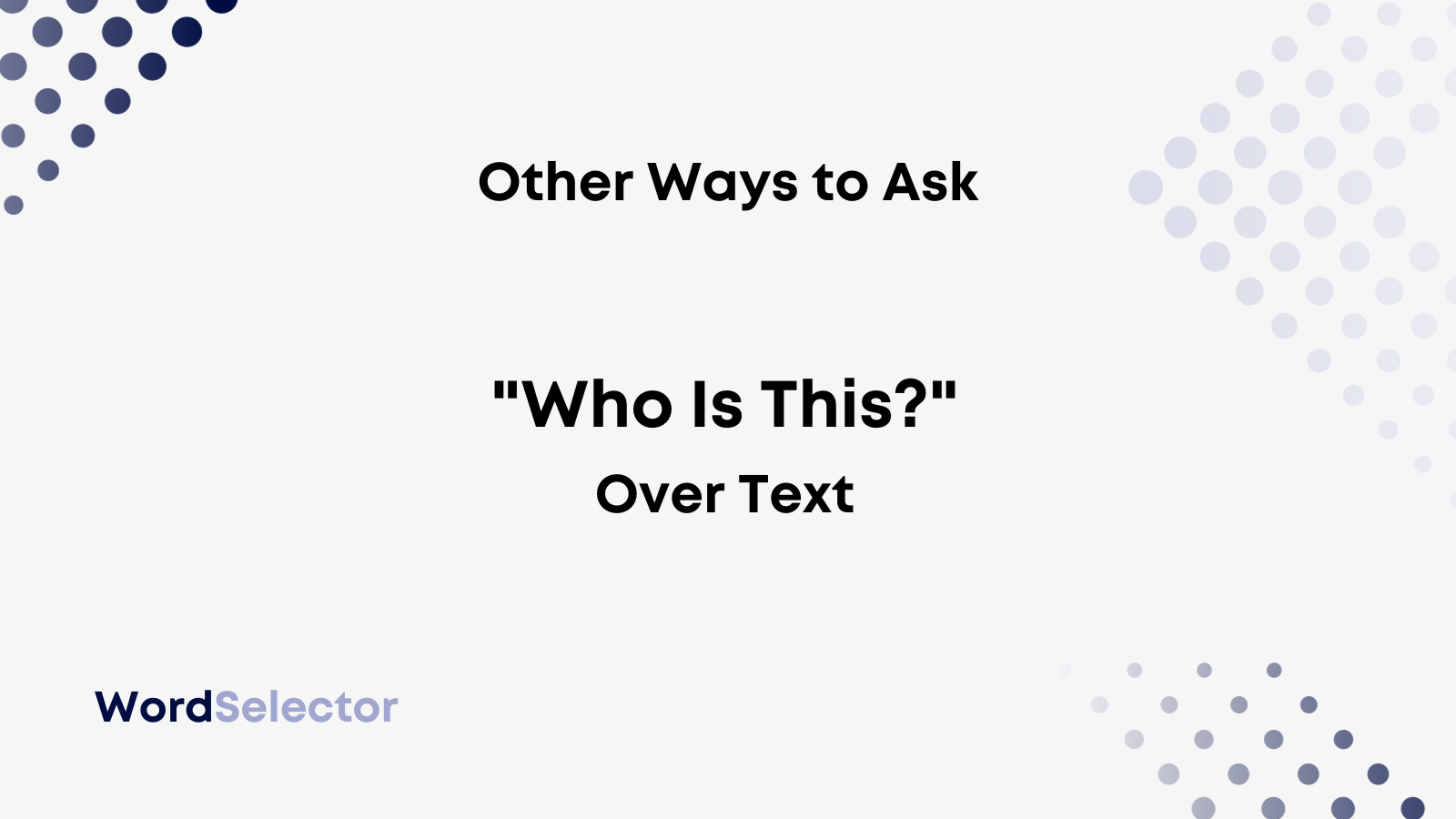Have you just received a text from an unknown number?
Perhaps you’re now trying to ask “who is this?” without sounding blunt or rude (in case it’s someone you know well).
Luckily, we’re here to help.
This article will explore how to ask an unknown person who they are when they text you.
Other Ways to Say “Who Is This?”
- May I ask who I’m speaking with?
- I’m sorry, but I don’t have your number saved
- Whose number is this?
- To whom do I owe the pleasure of this text?
- Excuse my curiosity, but who is on the other end?
- Can you provide me with your name, please?
- You’re not in my contacts, and I’d like to change that
- Forgive me, but I don’t know who you are
- Can you provide me with a name before we continue this conversation?
- I’m sorry, but I don’t recognize your number
KEY TAKEAWAYS
- “Who is this?” is a simple and effective way to ask who is on the other end of a text message.
- “May I ask who I’m speaking with?” helps to keep things formal and respectful in case you have a work phone.
- “I’m sorry, but I don’t have your number saved” is a great informal choice that shows you haven’t saved someone’s details.
Keep reading to learn how to ask “who is this?” politely. We’ll help you understand the best two phrases in formal and informal writing to keep things interesting.
Also, you can skip to the final section to learn if it’s correct to say “who is this?” So, you’ll know whether it’s appropriate whether you’re sending a text or WhatsApp message next time!
May I Ask Who I’m Speaking With? (Formal)
If you’re trying to figure out how to politely ask who is texting you, try “may I ask who I’m speaking with?”
This is a great formal question that works well when texting on your work phone. It shows that you’re cautious of using the wrong tone (after all, it could be your boss or a client).
Imagine if your boss texts you, and you reply with a simple “who is this?” That could result in offending your boss, so it’s best to use something like this to keep the peace!
Here are two message samples to show you how it can work:
May I ask who I’m speaking with? I recognize the message you’ve sent me, but I don’t have a name saved for your number.
May I ask who I’m speaking with before I continue with this line of questioning? That would be very beneficial, thank you.
I’m Sorry, but I Don’t Have Your Number Saved (Informal)
You can also say “I’m sorry, but I don’t have your number saved” to ask who is texting you.”
This works really well when messaging from your personal phone. The chances are high that it’s a friend or coworker, but you still need to check if you don’t have their number saved.
More often than not, this is the politest way to let someone know they’re not saved on your phone.
It won’t cause offense (unless the texter is overly sensitive). So, feel free to use it to sound as friendly as possible.
You can also review these message samples to learn more about it:
I’m sorry, but I don’t have your number saved. Please forgive me if this is someone I’m close to!
Oh, I’m sorry, but I don’t have your number saved. I’ll be happy to correct that mistake if you just let me know who this is!
Is It Correct to Say “Who Is This?”
It is correct to say “who is this?” in a text message.
It might seem simple, but it’s an easy way to work out who is texting you.
It’s not rude and simply shows that you have no name saved to a number. However, if you’re using a work phone, you might want to use something a bit more professional to avoid embarrassment.
Here are some text message samples showing you how it works:
While I’m sure that I know you, who is this? I don’t have any names saved in this phone yet.
Who is this? I need to save your name, so I know who you are if we continue this chat.
Make sure you use the correct form of “who” when writing this phrase, though. “Who” is the subject pronoun. “Whom” is an object pronoun. Some people get confused!
Remember:
- Correct: Who is this?
- Incorrect: Whom is this?
Also, try to use “this” instead of “it.” They apply to different contexts, so it’s best not to confuse them.
For instance:
- Who is this?
- Who is it?
Generally, “who is it” works better when someone rings a doorbell or needs to get your attention in person.
Finally, you might use the following phrase:
- Who are you?
Generally, “who are you?” is ruder than “who is this?” in a text. So, it’s best to avoid using it if you don’t know the recipient. You don’t want to offend them, after all.

